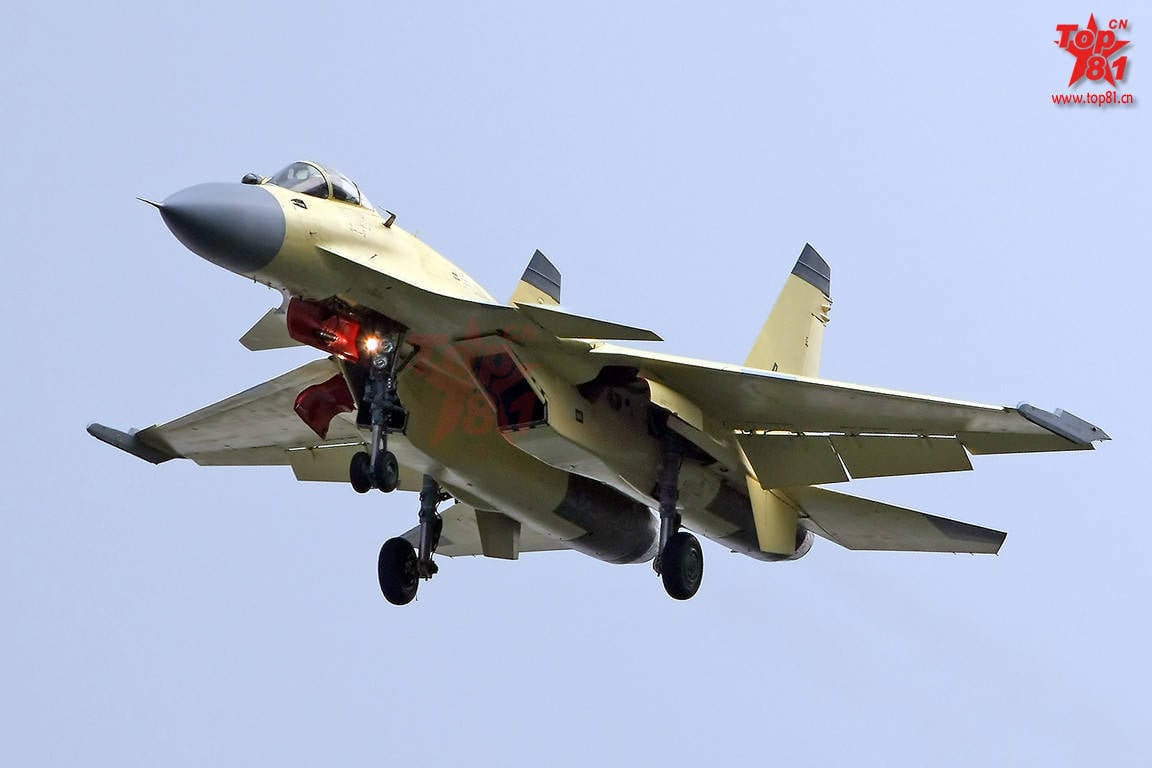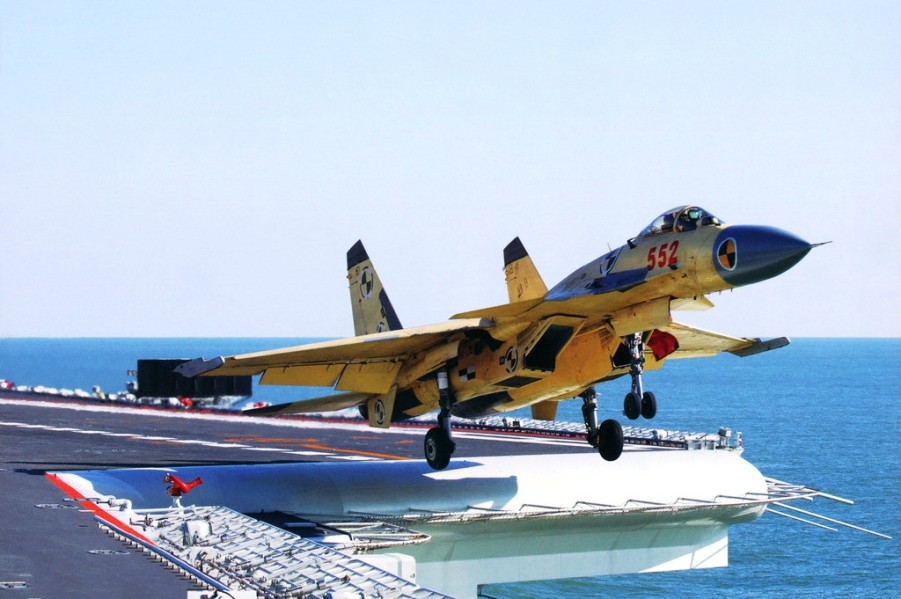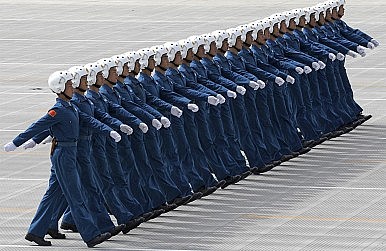.
.
.
.
I suppose there is no better way to promote your military hardware, and boost exports.
But there is more to this, than about mere military exports.
NATO Turkey has been sponsoring terrorists from the Sinkiang province in China for quite a while. This creates enormous problems for China who has been trying to deal with the issue for many years. Most of the Chinese government initiatives have been focused in the Sinkiang province..........
But why not deal with it at its source....NATO Turkey, and its long history of sponsoring terrorists.
NATO Turkey has moved several thousand Sinkiang refugee families from Turkey into Northern Syria...which presumably will form a solid base for pro-Turkish support out of Syria.
By fighting with Russia in Syria, China shows its solid strategic relationship with Russia, AND discourages NATO Turkey from sending waves of Uighur terrorists from Turkey into China. ........because you never know when a J-15 might accidentally stray into NATO Turkey territory and bomb the shit out of the wrong target...as mistakes happen in war.
There may ALSO be some business opportunities for China in post conflict Syria (requiring $150 billion investment after the war) and Iraq....with greater minerals .
This gives further greater legitimacy to the SCO, and China's peaceful intentions in the world.
________________________________________________
China Preparing to Hit Syria Jihadists Hard
Emboldened by Moscow's action in Syria, reports are that Beijing is ready to deploy its own forces to the region
.

While Russia successfully bombs unidentified targets – either ISIS or
U.S.-trained rebels – in Syria, China is planning to join Russia’s own
emerging coalition by deploying Shenyang J-15, a carrier-based
fighter aircraft.
.
 Numerous reports have
indicated that China is joining Russia’s airstrike campaign in Syria,
which has killed at least 39 civilians, including eight children and
eight women. [So far reports of civilian casualties from Russian airstrikes in Syria have proven dubious – RI]
.
Numerous reports have
indicated that China is joining Russia’s airstrike campaign in Syria,
which has killed at least 39 civilians, including eight children and
eight women. [So far reports of civilian casualties from Russian airstrikes in Syria have proven dubious – RI]
.
 With
a high risk of military clash between the U.S. and Russian forces
conducting overlapping air campaigns in Syria, the Russian and Chinese
joint airstrikes plan to bomb CIA’s proxy jihadists, including ISIS
militants in Syria.
.
With
a high risk of military clash between the U.S. and Russian forces
conducting overlapping air campaigns in Syria, the Russian and Chinese
joint airstrikes plan to bomb CIA’s proxy jihadists, including ISIS
militants in Syria.
. Several reports also suggested that a large
number of Chinese military advisers have already joined Russia’s
personnel in the Assad regime’s stronghold Latakia province.
.
Several reports also suggested that a large
number of Chinese military advisers have already joined Russia’s
personnel in the Assad regime’s stronghold Latakia province.
. The
news come a few days after Chinese Foreign Minister Wang Yi told a UN
Security Council meeting that the world can no longer afford to stand by
with its eyes closed on what is going on in Syria, while also not
“arbitrarily interfere” in the Syrian war.
.
The
news come a few days after Chinese Foreign Minister Wang Yi told a UN
Security Council meeting that the world can no longer afford to stand by
with its eyes closed on what is going on in Syria, while also not
“arbitrarily interfere” in the Syrian war.
.
 The Shenyang J-15
warplanes “will take off from the Chinese Liaoning-CV-16 aircraft
carrier, which reached Syrian shores on 26 September,” according to the
Israeli military and intelligence news website DEBKAfile with news that
Beijing is joining Moscow’s venture in Syria.
.
The Shenyang J-15
warplanes “will take off from the Chinese Liaoning-CV-16 aircraft
carrier, which reached Syrian shores on 26 September,” according to the
Israeli military and intelligence news website DEBKAfile with news that
Beijing is joining Moscow’s venture in Syria.
.
 It has been reported
that the Russians have managed to negotiate with the Syrian government
to provide them an exclusive access to some of the largest oil and gas
fields in the region in return for the Russian airstrikes.
.
It has been reported
that the Russians have managed to negotiate with the Syrian government
to provide them an exclusive access to some of the largest oil and gas
fields in the region in return for the Russian airstrikes.
.
 And
China, which recently carried out joint naval drills with Russia in the
Eastern Mediterranean and is expanding its military potential in the
neighboring Pakistan, has major plans for the Middle East, particularly
for Syria.
.
And
China, which recently carried out joint naval drills with Russia in the
Eastern Mediterranean and is expanding its military potential in the
neighboring Pakistan, has major plans for the Middle East, particularly
for Syria.
. China has stakes in Syria’s oil industry, in which
China’s state-owned National Petroleum Corporation holds shares in two
of Syria’s largest oil companies, while another Chinese company,
Sinochem, holds 50% of shares in Syrian oil fields.
China has stakes in Syria’s oil industry, in which
China’s state-owned National Petroleum Corporation holds shares in two
of Syria’s largest oil companies, while another Chinese company,
Sinochem, holds 50% of shares in Syrian oil fields.

Who will join Russia-China military alliance?
By providing the Assad regime with its troops and military equipment,
Russia has acquired a number of friends in the region, largely thanks
to showing its reliability as a partner.
.
 ValueWalk reported in August that there are indications of the emergence of the world’s new superpower axis
between China, Russia and Pakistan. Thus, the world is coming toward a
bipolar world with China, Russia, Pakistan and a number of other
countries of Central Asia and Middle East on one side, and the U.S., EU,
Japan and their Asian allies on the other side.
.
ValueWalk reported in August that there are indications of the emergence of the world’s new superpower axis
between China, Russia and Pakistan. Thus, the world is coming toward a
bipolar world with China, Russia, Pakistan and a number of other
countries of Central Asia and Middle East on one side, and the U.S., EU,
Japan and their Asian allies on the other side.
.
 And what we see
in Syria today takes us closer to that bipolar world. What we see now is
that Russian and U.S. officials have so far failed to coordinate their
actions in Syria, while the Kremlin has admitted targeting groups other
than ISIS militants in coordination with the Assad regime.
.
And what we see
in Syria today takes us closer to that bipolar world. What we see now is
that Russian and U.S. officials have so far failed to coordinate their
actions in Syria, while the Kremlin has admitted targeting groups other
than ISIS militants in coordination with the Assad regime.
.
 Another
thing that increases Russia’s global prestige is that Russian President
Vladimir Putin shows that Russia is a reliable ally unlike the U.S.,
who abandoned Iraq and Egypt’s President Hosni Mubarak in 2011 and does
not seems to be doing a great job in eliminating ISIS.
.
Israel,
another major player in the region, seems to be already secretly dealing
with Russia over Syria, in return for Putin’s promise that Israel’s
security will be protected. And Israeli Prime Minister Benjamin
Netanyahu’s recent visit to Moscow has shown that U.S. allies in the
region are not going to wait for the Obama administration to wake up.
.
Netanyahu is the first Middle Eastern leader that realized who is the new master of the Middle East, and flew to Moscow.
.
It
is still unclear how Israel is going to cooperate with Russia in Syria
given that Moscow has just formed an alliance with Iran, its traditional
rival, and Lebanon’s Hezbollah, which is backed by Iran and has been
fighting alongside the Assad regime since the beginning of the conflict,
which has killed over 230,000 people.
.
Hundreds of Iranian troops
have reportedly arrived in Syria along with military equipment to launch
ground combat operations on rebel-held areas and regain the control
over the Northern-Western part of Syria, which Syrian President Bashar
al-Assad’s opponents gained earlier this year.
.
The ground combat
operation with Iran, Hezbollah and the Syrian army will go hand in hand
with Russian airstrikes, which will likely get other Middle Eastern
states involved into the war in Syria.
.
Another
thing that increases Russia’s global prestige is that Russian President
Vladimir Putin shows that Russia is a reliable ally unlike the U.S.,
who abandoned Iraq and Egypt’s President Hosni Mubarak in 2011 and does
not seems to be doing a great job in eliminating ISIS.
.
Israel,
another major player in the region, seems to be already secretly dealing
with Russia over Syria, in return for Putin’s promise that Israel’s
security will be protected. And Israeli Prime Minister Benjamin
Netanyahu’s recent visit to Moscow has shown that U.S. allies in the
region are not going to wait for the Obama administration to wake up.
.
Netanyahu is the first Middle Eastern leader that realized who is the new master of the Middle East, and flew to Moscow.
.
It
is still unclear how Israel is going to cooperate with Russia in Syria
given that Moscow has just formed an alliance with Iran, its traditional
rival, and Lebanon’s Hezbollah, which is backed by Iran and has been
fighting alongside the Assad regime since the beginning of the conflict,
which has killed over 230,000 people.
.
Hundreds of Iranian troops
have reportedly arrived in Syria along with military equipment to launch
ground combat operations on rebel-held areas and regain the control
over the Northern-Western part of Syria, which Syrian President Bashar
al-Assad’s opponents gained earlier this year.
.
The ground combat
operation with Iran, Hezbollah and the Syrian army will go hand in hand
with Russian airstrikes, which will likely get other Middle Eastern
states involved into the war in Syria.
.











